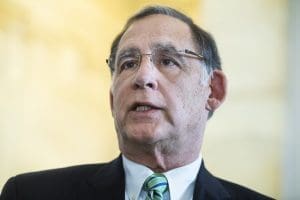Republicans pretend support for COVID relief has always been 'bipartisan'
‘Congress has a proven track record of working together to provide relief for Americans struggling as a result of the COVID-19 pandemic,’ Sen. John Boozman (R-AR) tweeted without irony.

As Senate Democrats move to push through President Joe Biden’s $1.9 trillion COVID relief package without Republican approval, GOP senators are criticizing Democrats for not using a more “bipartisan” approach — and falsely claiming they’ve always supported past Senate efforts to pass COVID relief.
Arkansas Republican Sen. John Boozman took to Twitter Friday to slam Democrats’ efforts to use budget reconciliation to pass Biden’s relief plan, claiming Senate Republicans have always been cooperative in the past in crafting COVID legislation.
“Congress has a proven track record of working together to provide relief for Americans struggling as a result of the COVID-19 pandemic,” he said. “Health care professionals, small businesses and hardworking Arkansans have all been helped by the bipartisan legislative packages.”
Sen. Shelley Moore Capito (R-WV) expressed a similar sentiment. “It’s unfortunate because in the past, COVID relief is one of the few places we have been able to build bipartisan consensus and deliver for the American people,” she tweeted, and criticized the package for being “passed without a single Republican vote.”
On Thursday, the Senate passed the budget resolution that would enable them to pass Biden’s COVID relief package without Republican support. The vote was along party lines — 51-50. Vice President Kamala Harris cast her first vote as a Senate tiebreaker.
Sen. Kevin Cramer (R-ND) also claimed Republicans had been cooperative in COVID negotiations.
“Instead of working together, as we did each time before, Democrats are trying to rush a nearly-$2 trillion partisan stimulus package through Congress before all the money from previous COVID-19 relief bills has even been spent,” he tweeted Friday.
He added, “Democratic colleagues and the Biden Administration to change course and work with us to craft a bipartisan, targeted package which will deliver relief to those who truly need it.”
Sen. Cynthia Lummis (R-WY) blasted the use of budget reconciliation as “partisan.”
“Only weeks after Democrats and Republicans came together for the fifth time in less than a year to pass bipartisan coronavirus relief legislation, ‘Unity’ President Joe Biden chose the partisan path,” she tweeted early Friday.
But Senate Republicans have been anything but cooperative with Democrats to pass COVID-19 relief legislation throughout the past year.
Republican Sens. Tim Scott (SC), Lindsey Graham (SC), and Ben Sasse (NE) threatened to hold up the CARES Act, the first COVID-19 relief bill passed in March, because they felt its unemployment benefits were too generous.
“If the federal government accidentally incentivizes layoffs, we risk life-threatening shortages in sectors where doctors, nurses, and pharmacists are trying to care for the sick, and where growers and grocers, truckers and cooks are trying to get food to families’ tables,” they wrote in a statement.
“We must sadly oppose the fast-tracking of this bill until this text is addressed, or the Department of Labor issues regulatory guidance that no American would earn more by not working than by working,” the statement continued.
The CARES Act did ultimately pass the Senate in a unanimous 96-0 vote on March 25.
In May, the House of Representatives passed the HEROES Act, a follow-up COVID-18 relief bill of more than $3 trillion dollars. But McConnell called it a “seasonal catalog of left-wing oddities” and blocked it from advancing in the Senate.
It would be seven months before the Senate would pass a second relief bill.
In early December, a bipartisan coalition of senators agreed upon the second $908 billion stimulus package. Senate Republicans attempted to block it because it contained too much state and local aid. McConnell refused to support the bill, and Sen. Rick Scott (R-FL) claimed it would “spend hundreds of billions of dollars in taxpayer money to bail out wasteful states.”
Later in December, McConnell blocked Senate Democrats from increasing $600 stimulus checks allotted to Americans in the second relief package to $2,000, despite Donald Trump’s support for the larger checks.
Sen. Bernie Sanders (I-VT), head of the Senate Budget Committee said Sunday that bipartisanship comes second to ensuring Americans get COVID relief.
“The issue is not bipartisanship or not,” Sanders said in an ABC appearance. “I don’t care what anybody says, we have got to deal with this pandemic. We have got to make sure that we are producing the vaccines that we need and get those vaccines into the arms of people.”
Last week, Biden expressed his commitment to COVID relief over bipartisan politics last week.
“I support passing COVID relief, with support from Republicans if we can get it,” he said. “But the COVID relief has to pass. There’s no ifs, ands, or buts.”
Published with permission of The American Independent Foundation.
Recommended

Biden calls for expanded child tax credit, taxes on wealthy in $7.2 trillion budget plan
President Joe Biden released his budget request for the upcoming fiscal year Monday, calling on Congress to stick to the spending agreement brokered last year and to revamp tax laws so that the “wealthy pay their fair share.”
By Jennifer Shutt, States Newsroom - March 11, 2024
December jobs report: Wages up, hiring steady as job market ends year strong
Friday’s jobs data showed a strong, resilient U.S. labor market with wages outpacing inflation — welcome news for Americans hoping to have more purchasing power in 2024.
By Casey Quinlan - January 05, 2024
Biden’s infrastructure law is boosting Nevada’s economy. Sam Brown opposed it.
The Nevada Republican U.S. Senate hopeful also spoke out against a rail project projected to create thousands of union jobs
By Jesse Valentine - November 15, 2023








































































